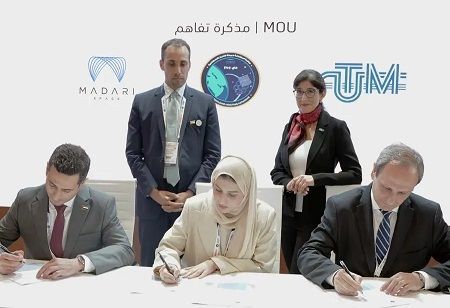Two novel projects have been chosen for the PHI-2 mission, one of which is proposed by Technical University of Moldova and the other by UAE's Madari Space Limited. The announcement was made at the 75th International Astronautical Congress (IAC) at Milan, through MBRSC and the United Nations Office for Outer Space Affairs, UNOOSA.
The Payload Hosting Initiative is one of the initiatives under the umbrella of UNOOSA's Access to Space for All Initiative, offering chances to global teams to launch scientific payloads into orbit using satellites developed by MBRSC. The initiative encourages growth in space science and technology and fosters innovative exploration efforts.
It will test two key space technologies from its National Centre for Space Technologies by the Technical University of Moldova. It plans to assess a commercial technology for an accurate satellite positioning in orbit and also study the resistance of nanosensors versus ionizing space radiation. Positive results could improve satellite navigation and increase the use of nanosensors in future space missions.
On the other hand, Madari Space Limited of the UAE plans to add its payload on PHI-2 after lifting off with hopes of seeking data storage and computing services in low Earth orbit, along with debris detection systems, while leveraging AI to address the mounting challenge of space debris or building up exploration capabilities. Indeed, it is the first time that a private company has been invited to participate in the Access to Space for All Initiative. It thus represents one of the most important successes of new space enterprises.
MBRSC Director General H.E. Salem Humaid AlMarri said: "The PHI-2 mission is an important milestone in our cooperation with UNOOSA and we share their vision of opening access to space for organizations that drive innovation.". Included here are its teams from Moldova and the UAE, demonstrating a commitment to advancing pioneering space technologies and broadly opening up the horizons of space science. Such international cooperation helps us accelerate technological progress while paving the way to a sustainable future for space and Earth alike.
Aarti Holla-Maini, Director of UNOOSA said: "The PHI initiative embodies our efforts to enhance the capability of developing nations in space science and technology. Since we announced the first PHI Awardees from Bahrain and Nepal, we are now delighted to announce the new winners from Moldova and the UAE. We look forward to these projects contributing to the sector of STEM education and underlining the benefits generated from our partnership with MBRSC.".
I would like to thank for the selection- Dr. Viorel Bostan, Rector of TUM. This historic achievement for our university and Moldova enhances our expertise in space technology and inspires the next generation in satellite technologies. It also supports Moldova's integration into the global space community, empowering us to advance our research capabilities and engage young talent.
Shareef Al Romaithi, CEO of Madari Space Limited, said, "This opportunity is the culmination of hard work and dedication from our team, working diligently towards changing the way data is managed in space and positioning the UAE on the world stage in technology advancements. We are grateful to MBRSC and UNOOSA for this opportunity and look forward to driving innovations in data storage and edge computing in low Earth orbit and beyond.".
Under this program, Bahrain's National Space Science Agency announced earlier that another satellite, known as PHI-1, is scheduled to be launched in 2025. The three collaborative entities include Bahrain's National Space Science Agency, Antarikchya Pratisthan Nepal, and the Sharjah Academy for Astronomy, Space Sciences and Technology (SAASST), which will test their technologies aboard the new PHI-1 satellite.
This aims to highlight the potential of the space sector in acting as a vehicle for economic and social development and reinforcing international cooperation and innovation on an inclusive scale.

